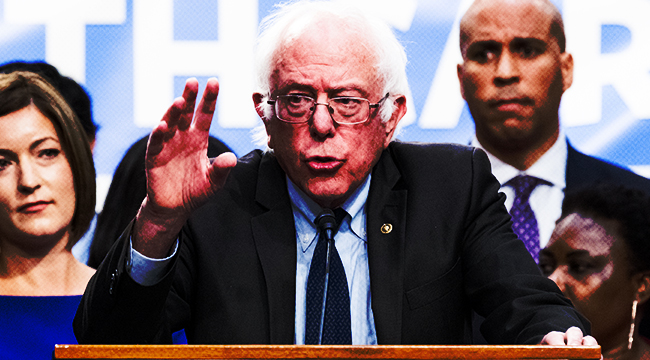
In June, as the fight over the repeal of the Affordable Care Act reached its climax, then-White House spokesman Sean Spicer delivered a warning. “It’s not a question of Obamacare versus the AHCA,” he said, referring to the GOP alternative, the since-failed American Health Care Act. The question, Spicer said, was between repealing Obamacare and moving to single payer.
History may prove him right. The battle over the Affordable Care Act is over. The fight for what comes next will begin in earnest on Wednesday with the introduction of Sen. Bernie Sanders’ bill to create a universal Medicare program, the most fleshed-out single-payer proposal ever introduced in Congress.
The campaign for the Vermont independent’s bill will start with the backing of at least 15 Democratic cosponsors and 24 progressive and healthcare advocacy groups, numbers that will only grow in the coming days and weeks.
Read a chapter-by-chapter summary here, or the executive summary here.
The bill starts by sweetening the pot for seniors who may be wary about welcoming the rest of the country into their warm pool. It eliminates copays and deductions, except for name-brand drugs when generics are available, and adds dental, vision, and hearing aid coverage to Medicare where it didn’t exist before — huge benefits that have long been a goal of public health advocates.
At the same time, people aged zero to 18 would be eligible for the coverage in the first year. In year two, the eligibility age would be lowered to 45. The next year, it would drop again to 35. In year four, the age restrictions would be eliminated.
The history of the expansion of the New Deal shows that once benefits have been enacted, they are difficult to take away. Opponents of Social Security, Medicare, and Medicaid have been working to cut or privatize all three since the day each was enacted, but instead each has grown over time. (The major exception was Aid to Families with Dependent Children, better known as welfare, which was repealed in 1996.)
By phasing in coverage, Sanders makes universal Medicare harder to repeal, and also easier for the public to understand. Everyone gets that transitioning when one turns 65 to Medicare is a relatively painless process. Under Sanders’ plan, people would begin transitioning, after the first year, at age 45 instead of 65. That’s not complicated.
The coverage of of dental care will also be life-changing for millions of people who live in pain — some of whom, unable to afford proper dental care, are even forced to change their diets.
The new Medicare bill leaves the Veterans Administration in place, and also allows tribal health care systems to continue operating as before. It would allow doctors and providers to opt out of the system on an annual basis, meaning that a private system would exist alongside the public system.
Sanders’ bill already has the backing of Democratic Sens. Elizabeth Warren, Mass., Kamala Harris, Calif., Cory Booker, N.J., Al Franken, Minn., and Kirsten Gillibrand of New York, suggesting that the Democratic nominee for president — if he or she comes from the ranks of politicians rather than Hollywood (Oprah, The Rock, etc.) — will more than likely be a backer of Sanders’ bill.
Presuming that the Senate won’t move on Sanders’ bill, it’s first real legislative debate would come if Democrats take the House of Representatives in 2018. Democratic members would face pressure in 2019 to study the bill in House committees and pass a version of it as something of a dry run. If Democrats follow a midterm wave by taking the White House in 2020, they’ll be positioned to move early on health care.
In 1993 and again in 2009, taking on health care at the front end of a Democratic administration turned out badly from an electoral perspective, but Democrats, if Wednesday is any indication, may believe the third time is a charm.
The post The Obamacare Fight Is Over — Now It’s On To Universal Medicare appeared first on The Intercept.
